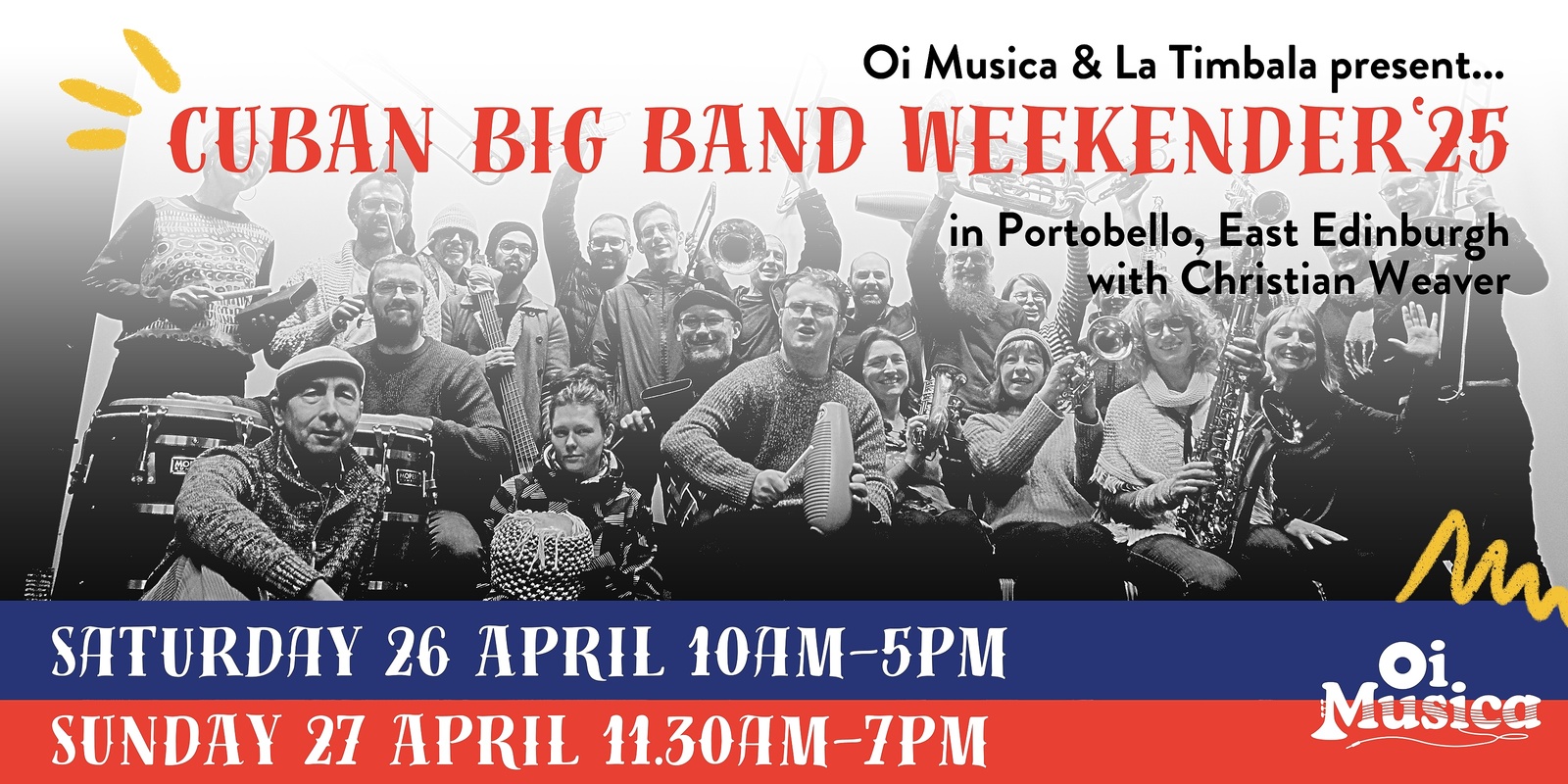Oi Musica & La Timbala present... Cuban Big Band Weekender April '25
Event description
The next in our series of Cuban Big Band Workshops is here!
After the success of our last full weekender in November, we've opted for the same format - two daytime workshops and an optional informal sharing event on the Sunday afternoon. You can book a stand-alone workshop day, or book for the full 2-day weekend.
These workshops are for players of brass / reed instruments and for singers of any ability who are happy working by ear. We are delighted to welcome back vocalist Rowan Oliver-Weaver, who will be working with the singers again.
The Saturday workshop will be held at Edinburgh College, Milton Rd campus and the Sunday workshop and sharing will be at Beach Lane Social Club in Portobello. More detailed timings and public tickets for the sharing will be announced in due course.
This is the fifth instalment in our Cuban Big band workshop series, and the group is building up a repertoire of material. If you haven't attended any previous workshops, you are very welcome! But please anticipate some advance listening and preparation so that you are familiar with the material beforehand. We will provide learning resources in advance.
We will also be looking at some new pieces of music, and we will confirm the material in February / March.
We are delighted to continue working with ethnomusicologist and Cuban music specialist Christian Weaver, director of Orquesta Timbala - a 25 piece Cuban Big Band founded in Manchester in 2005. Christian has researched and played music in Cuba and the UK since 1995.
The aim is to introduce you to the excitement, challenge and fun of playing Cuban big band music - exploring this vibrant dance music by working in a large ensemble with other musicians, under the direction of an experienced Cuban big band leader and with support from Oi Musica musicians.
Suitable for flute, clarinet, saxophones, trumpet, trombone, euphonium, tuba, sousaphone and vocalists. The session will be accompanied by percussionists from Oi Musica's network who have some experience of Cuban / Afrocuban percussion (if you are interested in booking as a percussionist, please contact us - places are limited).
Alongside the buzz of playing this hugely influential music, with its infectious rhythms and interlocking melody lines, the workshops will illuminate some of the concepts that shape and create it. As well as teaching and rehearsing the music we will make time to discuss the history and form of different genres (what is the difference between mambo and chachacha, or son and rumba?); the elusive and important rhythmic characteristics of the Clave; the function of each instrument in the ensemble; the relation of the melodies to the rhythms of the percussion; the importance of the song; and ‘timba’, that illusive element of swing, or attitude, that makes Cuban big band music so unique, joyous, and danceable.
A note for vocalists - we welcome anyone who is comfortable learning songs by ear. We have been lucky enough to have been sent some video resources direct from musicians in Cuba to aid the learning of the songs, which are available on a YouTube playlist here: https://www.youtube.com/playli...
We encourage vocalists to get familiar with the songs ahead of the workshop as we won't be working from choir-style vocal scores. To get the best, most authentic experience of Cuban music, vocal scores are not as helpful as learning by ear and orienting the song to the percussion.
The music covered so far (click on titles for YouTube links)
Corta y Clava by Pello El Afrokan
Donde Estabas Tu by Benny Moré
Se Que Me Llama by Pello El Afrokan
What is Cuban Big Band?
The tradition of the Cuban big bands really took off during the mambo era of the 1940s and 50s, when national Cuban stars such as Beny Moré (the original King of mambo) and Perez Prado (who many claim was the inventor of mambo) came to prominence. Large 'orquestas' of brass or strings, or both, had been a feature of Cuban music since the late 19th century, or earlier. However, the term Cuban Big Band usually refers to the type of bands that were prominent from the 1940s onward. This movement was greatly influenced by the jazz orchestras and big bands of the USA. Earlier, in New York, Cuban arranger Mario Bauza was busy introducing leading jazz players to the rhythms of Cuban popular music and creating new styles within Machito’s big band (founded in 1940). Jazz performers, such as Dizzy Gillespie, were hugely motivated by travelling to Cuba (famously describing Cuban rumba as the most advanced improvised music in the world). Gillespie in turn shared this enthusiasm with other US players such as Cannonball Adderley. In Cuba, musicians took the format of the big band, adapted it to their rhythmic sensibilities and developed new musical forms through it. One thing that identifies the Cuban big band style is the continued central role of the song (singer), and its ‘danceablitiy’.
In many respects, learning about Cuban big band music is a case of learning how to recognise, and play within the rhythmic parameters that define each style, and each section of each style, all of which (with the exception of the earlier Danzòn) are based on, and controlled by, the Cuban clave.
Tickets for good, not greed Humanitix dedicates 100% of profits from booking fees to charity

